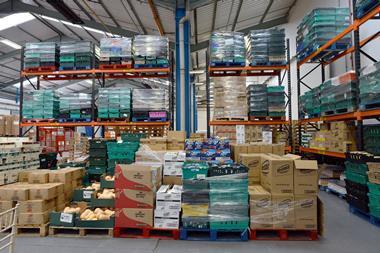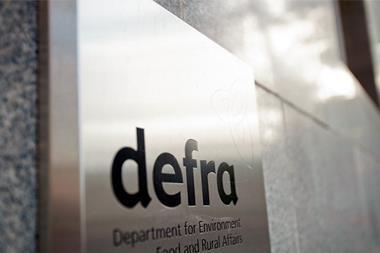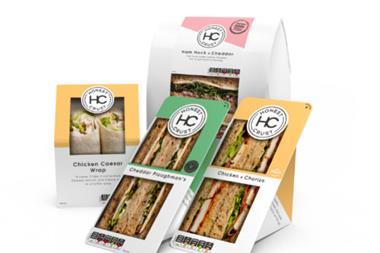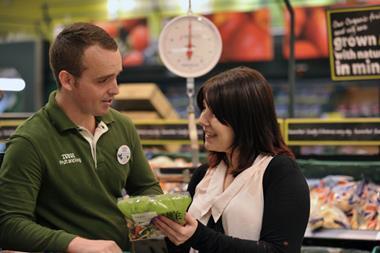Following two years of campaigning from The Grocer, Defra is to invest in redistribution, allowing charities to scale up operations
Michael Gove’s talk of a “Hamas-hugging, high-taxing, job-destroying” Jeremy Corbyn might have got Conservative blood pumping at Birmingham’s Symphony Hall this week, but it was the environment secretary’s announcement on food waste that should have had industry fired up.
Gove announced plans for a £15m pilot scheme to subsidise the redistribution of edible food surplus and put a stop to the “environmental, economic and moral folly” of good food going to waste. This cash, Defra believes, can unlock access to 100,000 tonnes (equivalent to 250 million meals) of edible food wasted by industry and to support its redistribution to thousands of UK charities.
“Nobody wants to see good food go to waste,” Gove later added. “It harms our environment, it’s bad for business - and it’s morally indefensible.”
We agree. What only took Gove a matter of 30 seconds to announce has taken more than two years of campaigning via our Waste Not Want Not campaign, working alongside FareShare, to reach a milestone we believe could change the landscape on surplus.
Opinion: Gove’s pledge represents a staggering success in the fight against food waste
In May 2016, we launched our campaign with three clear aims: to double the amount of food currently being redistributed by supermarkets and suppliers; to achieve greater engagement, transparency and co-operation among industry stakeholders, and, finally, to call on government to provide funding as a boost to redistribution.
It was that last element - to eke cash out of a government clamping down on every area of funding - that provided the biggest challenge. As far back as September 2016, we presented our proposal, devised with FareShare, for a scheme that would level the playing field, by which it can cost businesses less to bin or burn their surplus than to send it to charity. In fact, it costs on average £100 per tonne to separate, store and transport that food, a considerable sum for smaller operators. As FareShare’s CEO Lindsay Boswell put it, “we’ve not met a single individual or corporate brain that doesn’t think diverting surplus food is anything other than the right thing to do. However there is a real additional cost to doing the right thing.”
It has taken months to get those in charge to agree, with many setbacks along the way. Not least the swift dismissal of recommendations of an expert Efra Select Committee in April 2017 that government should consider this funding model. So, six months later, we presented the same proposal to the great and good of industry, charity and politics at a parliamentary reception at the House of Commons, where we also announced the launch of our petition formally calling on government to think again. Another six months later and armed with 16,000 signatures, our petition made its way to Gove and his team.
Opinion: Food waste announcement is great, but there’s work to do
After further behind the scenes lobbying, this week Gove finally confirmed he would make that cash available.
Now Gove has confirmed he will make the cash available, the difference it could make is transformational. “As it currently stands, it actually costs food businesses more to redistribute food to people than it would to send food to anaerobic digestion or waste,” reiterates City Harvest CEO Laura Winningham. Addressing the cost barrier for businesses “will help get more food to the growing population of hungry people we serve. “We’ve grown rapidly to meet the significant demand from partner charities and just redistributed food for our three millionth meal. We’re certain this new incentive will increase our food donations and fuel our growth.”
“Independent research has put the social and economic return FareShare currently delivers to the UK at £51m per annum in health, education and social benefits,” adds Boswell. “This £15m fund will mean FareShare and other charities in this vital area can dramatically scale up their operations - supplying 10 times more fresh surplus food to charities, and delivering at least £500m in social value every year.” In short, this money is not a donation. It is a strategic investment.
The practical details
But how might it work in practice? The truth is, we don’t know. We know the initial investment will last for one year, with a view to extending it if it works. And we know it will be focused on connecting edible surplus from industry with charities. Beyond that, Gove has only said “in the coming months we will work closely with business, charities and volunteers” to thrash out the details.
Boswell hopes it will focus on the types (and volumes) of food the charity sector requires rather than simply that supplied by industry. “It makes sense to focus on fresh produce, protein and so on rather than fizzy drinks and morning bakery,” he says. He also envisages a focus on the supply chain, rather than supermarkets, which are already “leading the way in back-of-store redistribution and in the right position to make these investments themselves”. The need for funding lies instead with “high-volume, small-margin supply chain food producers [which] are extremely cost sensitive”.
Reduction Roadmap: is this the breakthrough we needed on food waste?
To support the fair distribution of funds, he also suggests “we now work with the various sector specialist umbrella bodies such as, but not exclusively, the Fresh Produce Consortium, the British Poultry Council, British Frozen Food Federation, the FDF and the NFU and so on” to reach a tailored cost per tonne for redistribution, rather than relying on the average of £100 currently used as a base until now.
Winningham would like to see the whole length of the redistribution operation looked at. “We still require funding directly for our ‘last mile’ food rescue operations, including costs for our fleet and drivers, and hope this fund factors in the inherent costs of food redistribution operations.”
For Nick Davies, founder of Neighbourly, there is also hope the commitment will pave the way for further legislative intervention when it comes to reducing food waste. “This is an important development and congratulations should go to The Grocer for their influential campaigning,” he says. “Money for storage and transport capacity is clearly important but I’m keen to see an ambition from government to overhaul legislation that simply wasn’t designed for a problem like food surplus redistribution - further clarification of the law around date-marking, food traceability and the treatment of surplus for VAT purposes, for example.”
That includes putting food waste front and centre of the planned post-Brexit Resources & Waste Strategy. “By explicitly promoting both commercial and social redistribution in the forthcoming Resources & Waste Strategy, the government can take a huge step forward to maximise the impact of redistribution within the industry,” says Jane Marren, managing director at Company Shop. “This will realise further positive and sustainable outcomes, economically, socially and environmentally, as well as supporting the government to achieve its goals.”
In other words, it has taken years to get here. But there is still more to do. “This announcement is a valuable step to rebalancing incentives in the UK away from AD up the food waste hierarchy,” sums up Martin Bowman, campaigns manager for This Is Rubbish. “But our focus should be on designing food poverty and food waste out of the system in the first place.”



















No comments yet